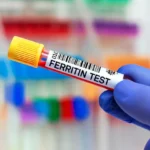If you’ve been experiencing unexplained hair loss, you may be wondering if there’s a hidden connection between your hair thinning and gastrointestinal issues like Helicobacter pylori (H. pylori). H. pylori, a common bacterial infection of the stomach, is linked to several health conditions, but recent studies suggest it might also play a role in hair …
If you’ve been experiencing unexplained hair loss, you may be wondering if there’s a hidden connection between your hair thinning and gastrointestinal issues like Helicobacter pylori (H. pylori). H. pylori, a common bacterial infection of the stomach, is linked to several health conditions, but recent studies suggest it might also play a role in hair loss.
In this post, we’ll delve into the connection between H. pylori and hair loss, explore potential mechanisms, and discuss ways to address both conditions effectively.
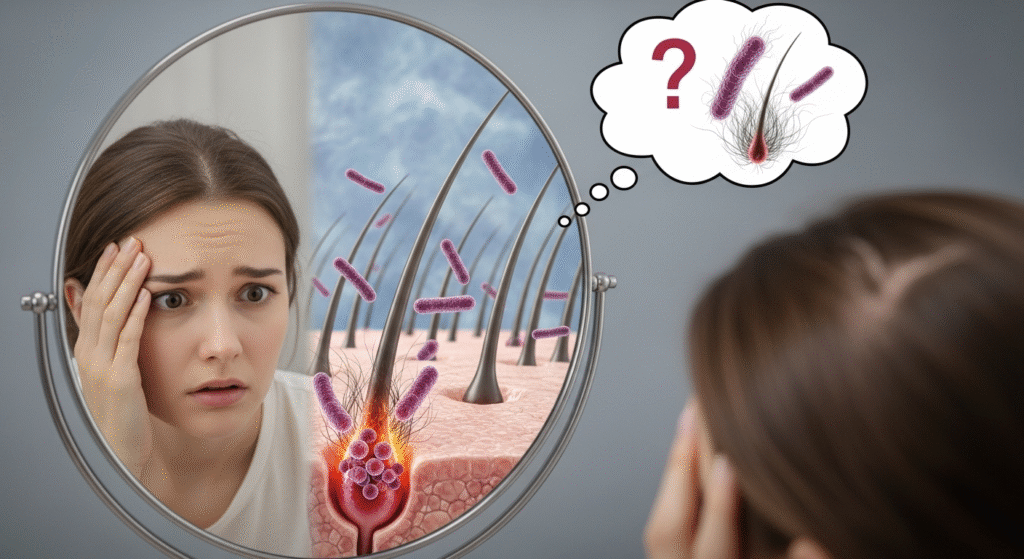
Understanding Can Helicobacter Pylori Cause Hair Loss
What Is Helicobacter Pylori?
Helicobacter pylori (H. pylori) is a type of bacteria that commonly infects the stomach lining. It is estimated that over half of the world’s population carries this bacterium, though many remain asymptomatic.
The infection often leads to conditions like chronic gastritis, peptic ulcers, and even increases the risk of gastric cancer in severe cases.
Common Symptoms of H. Pylori Infection
While H. pylori doesn’t always cause noticeable symptoms, when it does, they include:
- Abdominal pain or discomfort
- Bloating and nausea
- Frequent indigestion
- Loss of appetite and weight loss
If left untreated, H. pylori infection can result in nutrient malabsorption, which may contribute to hair loss due to deficiencies, particularly in iron and vitamin B12.
The Link Between H. Pylori and Hair Loss
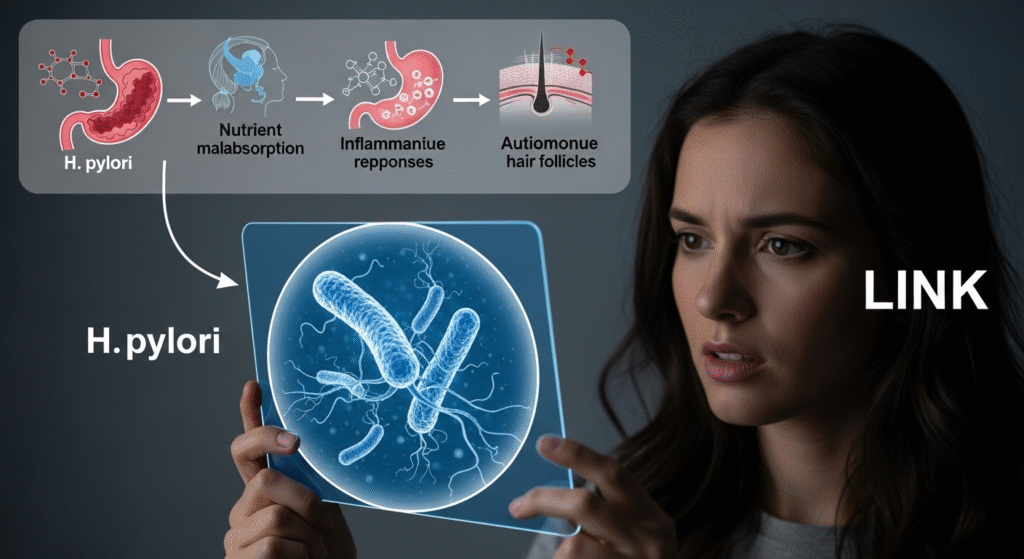
Alopecia Areata and H. Pylori
Alopecia areata, an autoimmune condition where the body attacks its own hair follicles, has been found more commonly in individuals with H. pylori infection. However, the research is mixed. Some studies show a higher prevalence of H. pylori in those suffering from alopecia areata, while others find no significant link.
The potential connection might be due to the chronic inflammation caused by H. pylori, which can disrupt immune functions and contribute to hair follicle dysfunction.
Telogen Effluvium and Nutrient Deficiency
Telogen effluvium, a condition where hair prematurely enters the shedding phase, can be triggered by stress, illness, or nutrient deficiencies. H. pylori infection is associated with nutrient malabsorption, particularly of iron, zinc, and vitamins essential for hair growth. This nutritional deficiency could result in hair thinning or shedding, especially in individuals who are not managing their nutritional intake properly.
Studies show that restoring iron levels through supplementation can improve hair regrowth in individuals whose hair loss is linked to H. pylori-induced deficiencies.
Expert Opinions and Medical Insights
Potential Mechanisms
The most likely mechanisms by which H. pylori could contribute to hair loss involve:
- Chronic Inflammation: Persistent infection may lead to systemic inflammation, which could disrupt the normal hair growth cycle.
- Nutrient Deficiency: H. pylori can impair the absorption of essential nutrients like iron and vitamin B12, which are critical for hair growth and maintenance.
Diagnosis and Treatment Options
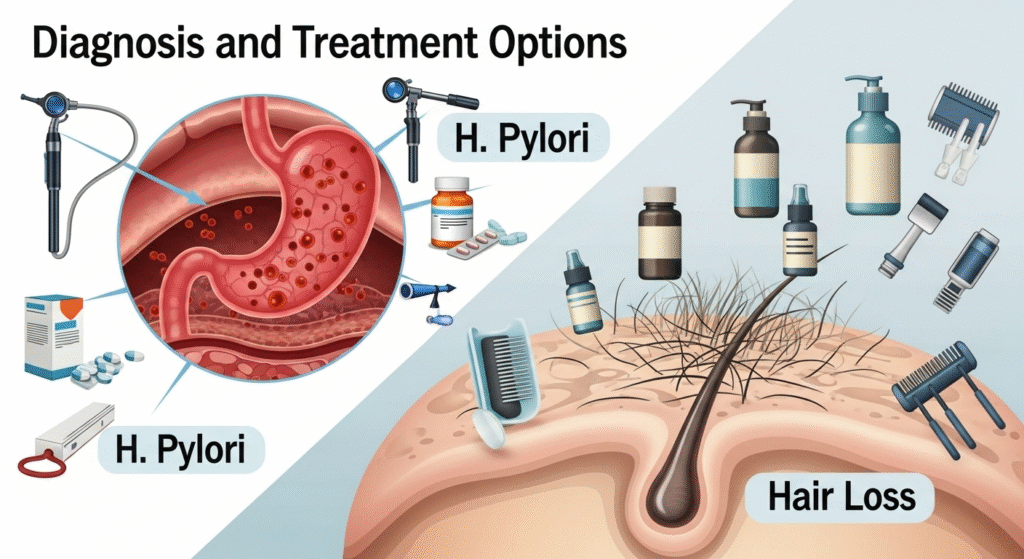
Diagnostic Tests
If you suspect that H. pylori infection could be contributing to your hair loss, it’s important to seek medical advice for diagnosis. Tests to detect H. pylori include:
- Stool antigen tests: A non-invasive test that detects H. pylori in stool samples.
- Urea breath tests: This test measures the presence of carbon dioxide after you drink a special solution containing urea.
- Endoscopy: In some cases, doctors may recommend an endoscopy to examine the stomach lining for signs of infection.
Treatment Approaches
Treating H. pylori typically involves a course of antibiotics and proton pump inhibitors (PPIs) to reduce stomach acid and eliminate the bacteria. Alongside this, managing nutrient deficiencies may help mitigate hair loss:
- Iron supplementation: Restoring iron levels can help prevent hair shedding.
- Dietary adjustments: Incorporating foods rich in iron, zinc, and B-vitamins can support healthy hair growth.
Practical Steps to Take
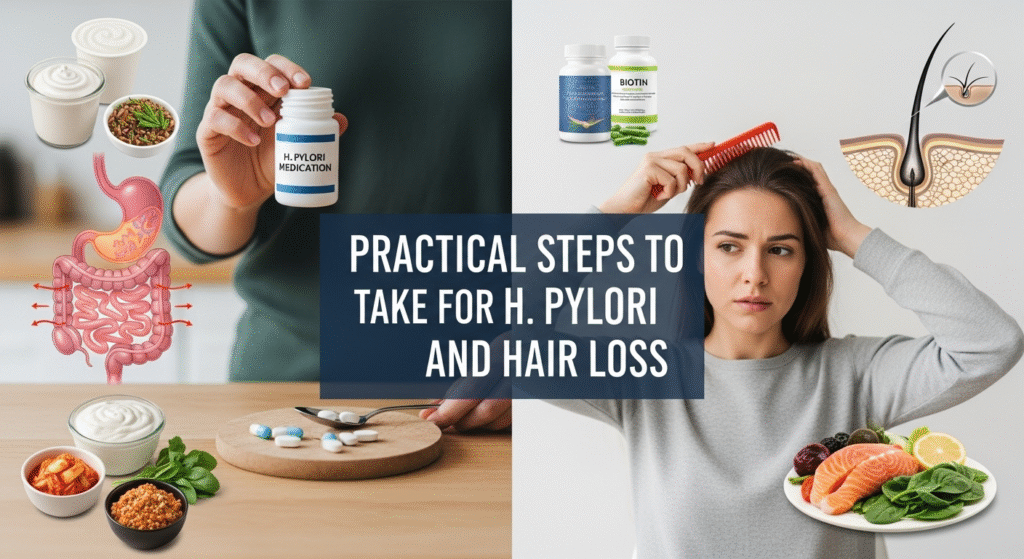
Consult Healthcare Providers
If you’re dealing with both hair loss and potential H. pylori infection, consult both a dermatologist and a gastroenterologist. They can collaborate to diagnose the root cause of your symptoms and recommend appropriate treatments.
Monitor Nutrient Levels
Regular blood tests can help track deficiencies in iron, zinc, and vitamin B12. If these levels are low, supplementation under medical supervision can help improve hair health.
Consider Diet and Lifestyle Changes
- Iron-rich foods: Include spinach, lentils, and red meat.
- Probiotics: Foods like yogurt and kefir can help balance your gut microbiome and support digestion, especially after H. pylori treatment.
FAQs
Can H. Pylori directly cause hair loss?
There’s no definitive evidence linking H. pylori to direct hair loss. However, the infection can cause nutrient deficiencies, which may lead to hair shedding.
Is hair loss reversible after H. Pylori treatment?
In many cases, addressing the H. pylori infection and replenishing nutrient levels can lead to significant hair regrowth.
How can I prevent H. Pylori infection?
Good hygiene practices, such as washing hands regularly, drinking clean water, and avoiding undercooked food, can help prevent H. pylori infection.
Conclusion
While the direct link between Helicobacter pylori infection and hair loss remains uncertain, it is clear that the infection can lead to nutritional deficiencies, which are a known cause of hair shedding.
If you are dealing with both H. pylori infection and hair loss, it is essential to seek treatment from medical professionals. By addressing both conditions, you may see an improvement in your hair growth and overall health.
If you’re experiencing hair loss and suspect it may be related to Helicobacter pylori infection, book a consultation with Dr. Uzma Irfan, an ISHRS-certified surgeon in Islamabad today . Our team is ready to help you with a comprehensive diagnosis and personalized treatment plan to get your health and hair back on track.


